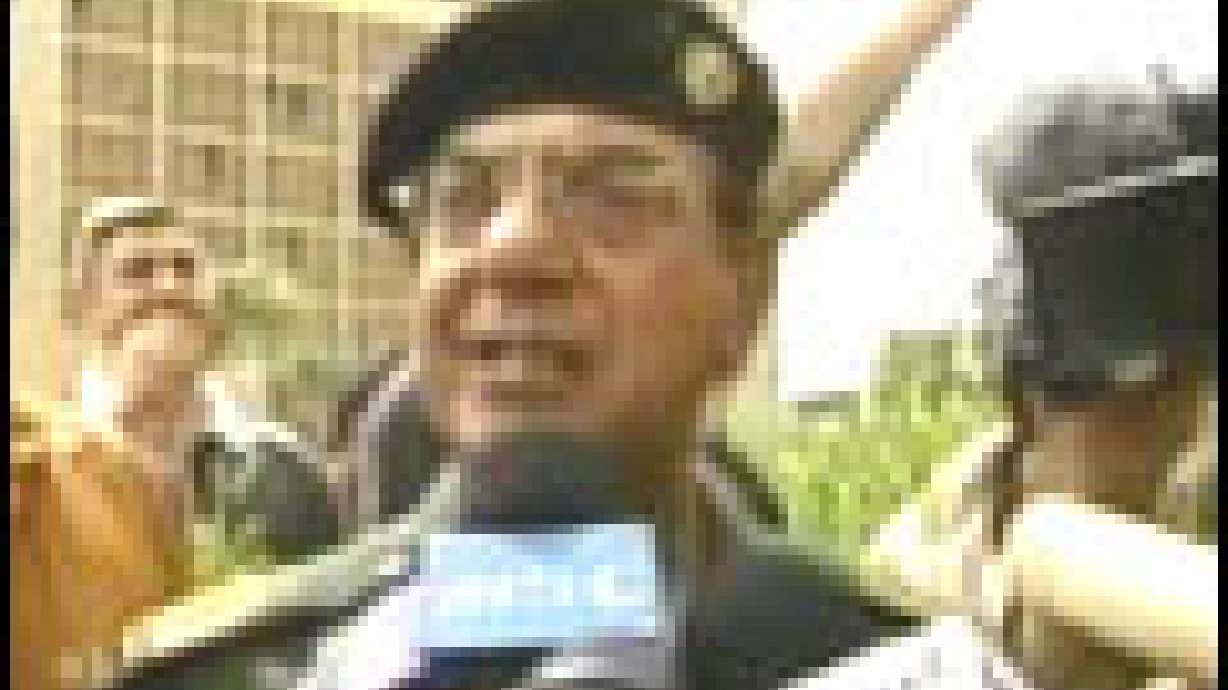Estimated read time: 4-5 minutes
This archived news story is available only for your personal, non-commercial use. Information in the story may be outdated or superseded by additional information. Reading or replaying the story in its archived form does not constitute a republication of the story.
DOHA, Qatar (AP) -- The television pictures of U.S. tanks in Baghdad seemed undeniable, but Iraqi President Saddam Hussein's spokesman denied them anyway -- with his usual flair for insult.
"There is no presence of American infidels in the city of Baghdad," Mohammed Saeed al-Sahhaf asserted outside Baghdad's Palestine Hotel on Monday.
A day later, when the hotel came under U.S. tank fire, the Iraqi information minister had to admit to the journalists staying there that coalition forces were in the capital. But, smiling, he made it sound like it was all part of Iraq's plan:
"We blocked them inside the city. Their rear is blocked," he said in hurried remarks that were a departure from his daily news conference.
Across the region, Arabs hoping for victory over the United States -- hated for its support of Israel and portrayed as attacking Iraq only for its oil -- embrace al-Sahhaf's version. And even when they can't believe what he is saying, they like the way he says it.
They get a kick out of the way he ridicules President Bush and British Prime Minister Tony Blair in daily news conferences, broadcast live. Some call it the "al-Sahhaf show."
Al-Sahhaf has even introduced insults virtually unknown to the Arab public. His use, for example, of "uluj," an obscure and particularly insulting term for "infidel," sent viewers leafing through their dictionaries and calling TV stations for a definition.
His enemies are never just the Americans or the British. They are "outlaws," "war criminals," "fools," "stooges," an "international gang of villains."
Al-Sahhaf has singled out Secretary of Defense Donald Rumsfeld, describing him as a "crook" and "the most despicable creature."
Al-Sahhaf's face, clean-shaven in contrast to most Iraqi officials who sport Saddam-style mustaches, has become a TV fixture, along with his black beret and green Baath party uniform.
"American cruise Tomahawk missiles bomb Iraq, and al-Sahhaf missiles of words deafen the American and allied ears," read a headline in the Saudi-owned pan-Arab newspaper Asharq al-Awsat.
Viewers don't "pause at what he (al-Sahhaf) says as much as they are eager to listen to his funny words," wrote Faisal Salman, managing editor of the Lebanese newspaper As-Safir, in his daily column.
Some Arab commentators have dubbed al-Sahhaf the "Iraqi Goebbels," after Joseph Goebbels, Hitler's master propagandist.
Al-Sahhaf is no stranger to the media and its impact -- and to Iraq's rough politics.
He was studying to be an English teacher when he got his start in politics in 1963 by joining a violent group led by Saddam that targeted opponents of the Baath party. After a 1963 coup, he revealed the whereabouts of his brother-in-law, an army general and the country's military prosecutor, who was then killed by Baath party militias. By handing over his relative, al-Sahhaf proved his loyalty to the Baath party.
A Baathist regime was overthrown in another coup the same year, but the party came back five years later. Al-Sahhaf was put in charge of securing the radio and television stations and then put at the helm of both. He was known for his temper -- even kicking TV and radio employees who displeased him.
Al-Sahhaf, who is in his early 60s, has been information minister since 2001. Before that, he was foreign minister, from 1993 to 2001. He also has served as Iraq's ambassador to India, Italy and the United Nations.
Although al-Sahhaf has become the most prominent face of the regime of late, he does not have the political or military clout of Saddam's relatives and clansmen.
Al-Sahhaf is from Iraq's majority Shiite Muslim community, long dominated by Sunnis like Saddam. He has middle-class roots -- the family name refers to his father's bookbinding craft -- and comes from Hilla, south of Baghdad, not Saddam's Tikrit power base.
Still, it was al-Sahhaf who delivered a recent message in Saddam's name calling for jihad, or holy war, and urging Iraqis to fight on.
Saddam also used al-Sahhaf to deliver some of his more conciliatory messages. Late last year, al-Sahhaf apologized in a statement in the president's name to the people of Kuwait for the 1990 Iraqi invasion. The statement, though, went on to criticize the Kuwaiti leadership for relying on American help.
(Copyright 2003 by The Associated Press. All Rights Reserved.)








